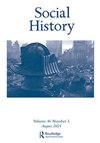在希腊和土耳其工作:1840-1940年,从帝国到民族国家的比较劳工史
IF 1.1
1区 历史学
Q1 HISTORY
引用次数: 1
摘要
政府从矿工养老金计划(Mineworkers’Pension Scheme)中提取盈余,限制工伤赔偿,并拒绝公开调查司法不公,比如1984年6月警察对奥格里夫(Orgreave)矿工精心策划的袭击。20世纪90年代和21世纪初弥漫在煤田的绝望感,预示着巨大的政治转变。首相托尼·布莱尔和新工党政策的设计师彼得·曼德尔森都在英格兰东北部拥有议会席位,而保守党在2019年赢得了这些席位。这本书详尽地解释了工党在前英国煤田的支持率下降并不是最近才出现的现象。在上世纪60年代煤矿关闭的地区,保守党的支持率更高,而在上世纪90年代仍保留煤矿的地区,保守党的支持率较低,但仍然很高。这里有一个需要进一步研究的空白,那就是英国民族主义在推动对保守党的支持方面所起的作用。在1931年的大选中,工党在达勒姆的选票支离破碎,但在南威尔士却岿然屹立(26票)。类似的选举结果在2021年的地方议会选举中也很明显。作为更广泛的威尔士身份的一部分,劳工文化似乎保留了一些共鸣,而在达勒姆郡、东北部和中部地区的前煤炭社区,它与英国脱欧后的英格兰特色从根本上脱节了。这本书对英国煤炭工业的史学及其产生的文化做出了重大贡献。对于研究20世纪英国的历史学家来说,这本书应该是必读的,但对于那些致力于将工党与后工业工人阶级重新联系起来的人来说,这本书可能是最重要的。正如英国脱欧公投和2019年大选所揭示的那样,“黑社会之王”并没有完全被驱逐到历史书的领域,煤矿的阴影继续对英国政治产生巨大影响。本文章由计算机程序翻译,如有差异,请以英文原文为准。
Working in Greece and Turkey: a comparative labour history from empires to nation-states, 1840–1940
ment extracted surpluses from the Mineworkers’ Pension Scheme, limited compensation payments for injury, and denied public inquiries into miscarriages of justice, such as the orchestrated police attack on miners at Orgreave in June 1984. The sense of hopelessness that pervaded the coalfields in the 1990s and early 2000s signalled seismic political shifts. Both Prime Minister Tony Blair and architect of New Labour policy Peter Mandelson held parliamentary seats in north-east England, which in 2019 were won by the Conservatives. The book explains in substantial detail that the decline of the Labour vote in former English coalfields was not a recent phenomenon. The Conservative vote was deeper in localities that had witnessed mine closures in the 1960s, and weaker, but still substantial, in those that retained mines into the 1990s. One lacuna here that is in need of further research is the role of English nationalism in fuelling support for the Conservatives. In the 1931 general election, the Labour vote in Durham fragmented, but in South Wales it held firm (26). Similar electoral outcomes were evident in local council elections in 2021. It would appear that labour culture retained some resonance as part of a broader Welsh identity, whereas in former coal communities in County Durham, the North East and the Midlands it has been fundamentally disconnected from a post-Brexit Englishness. The book is a major contribution to the historiography of the British coal industry, and the culture it produced. It should be required reading for historians of twentiethcentury Britain, but perhaps most importantly for those who are committed to reconnecting the Labour Party to the post-industrial working class. As the Brexit vote and the 2019 general election revealed, the ‘kings of the underworld’ were not quite banished to the realms of the history books, and the shadow of the mine continued to have a dramatic impact on British politics.
求助全文
通过发布文献求助,成功后即可免费获取论文全文。
去求助
来源期刊

Social History
HISTORY-
CiteScore
1.10
自引率
0.00%
发文量
37
期刊介绍:
For more than thirty years, Social History has published scholarly work of consistently high quality, without restrictions of period or geography. Social History is now minded to develop further the scope of the journal in content and to seek further experiment in terms of format. The editorial object remains unchanged - to enable discussion, to provoke argument, and to create space for criticism and scholarship. In recent years the content of Social History has expanded to include a good deal more European and American work as well as, increasingly, work from and about Africa, South Asia and Latin America.
 求助内容:
求助内容: 应助结果提醒方式:
应助结果提醒方式:


